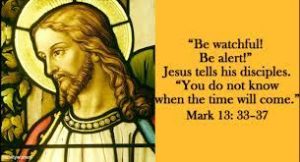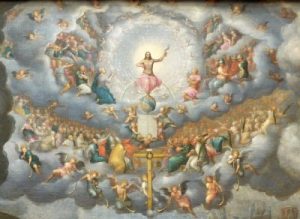- Isaiah 63:16-17, 19
- Psalm 80:2-3, 15-16, 18-19
- 1 Corinthians 1:3-9
- Mark 13:33-37On late Friday evening on December 1, 2023, I arrived from a month vacation in the Philippines, rejuvenated and refreshed from eating my favorite tropical fruits and the renewal of relationships with my brothers, sister, nephews, nieces and with my Augustinian confreres.
Today is the first Sunday of Advent; however, in the Philippines, people started decorating Christmas trees with snowballs and snowmen even though we don’t have snow. Christmas songs are on the air, and they put up Christmas “parols” or lighted lanterns along the streets, and the Nativity scene inside the house as early as September. Filipinos’ major feast is Christmas, and it is also our Thanksgiving Day. Filipinos don’t want to live in the wait, so they over emphasize anticipation of the coming of Christmas. I know Christmas is coming but not as early as September or today, the first Sunday of Advent.
The Sunday readings today call us to be conscious of where we are in our relationship with God. The first reading from the Book of the Prophet Isaiah wants to remind us that in this season of Advent, we must renew our relationship with God. The Prophet Isaiah is pointing us to God, our Father and Redeemer, and letting us focus on how God works in our hearts. God has called us so that we are in the right place. He sustained us with gifts, but all the goodness of God must be acknowledged and responded to that we are deeply willing for His coming in our lives again. If we have difficulty in trying to connect with God, we journey with the Prophet Isaiah’s struggle, who admits that we have created a mess in our lives, but just as God has tried to reconnect with His people, we must also intend to try our best to be with God.
The 2nd reading from the letter of St. Paul to the Corinthians is inspiring to be always grateful. St. Paul says, “I give thanks to my God always on your account for the grace of God bestowed on you in Christ Jesus…..so that you are not lacking in any spiritual gift as you wait…” These words of St. Paul bring to our attention that the consolations of God, peace, kindness, and mercy, are actually given to us, which manifests God’s faithfulness and, therefore, calling us to fellowship, to communion.
The gospel of St. Mark expresses the need to “Be watchful! Be alert!” To be watchful is to foresee the coming of the Lord. Even though, Jesus says, “You do not know when the time has come.” But we must wait for that time and be alert, as we are warned that something will certainly happen. It is through faith and confidence that there will be an end to our waiting.
As Catholic, how am I to be in the waiting? First, the Catholic Church teaches that Advent is a time of waiting, anticipation, expectation, joy and preparation for the coming of Jesus, the promised Messiah. It is a season of looking forward to something wonderful, the promise of the ages. It is a waiting time focused on the future return of our Savior by looking back to when He first came and lived with us in history. This is a glance of the past which is connected to His second coming. It means Someone is coming and something will be an exceedingly new experience as He promised.
Second, the responsorial psalm today which says, “Lord, make us turn to you. Let us see your face and we shall be saved,” is a plea, our desperate admission that we really need help from the coming of the Son of Man who will give us new life when we call upon Him. Through this, man at God’s right hand, will bring back all of us to God, who favors our salvation.
Third, in the gospel today, we do find ourselves like servants left behind to carry out tasks while the Master of the household is apparently absent. It means that we are taking that responsibility to perform our work well. We are expected to be alert and awake for the Master’s return, for at anytime He will come when we least expect.
This season of Advent is a season to extend more time in prayer. Prayer is truly necessary to come into our consciousness that we need God in our lives. Let us allow God to enter our hearts and our world. We are divided and lost. This is the time for making profound preparations and offering sacrifices so that at the right time of Christ’s coming, He will restore us through His divine healing and forgiveness. If you are still sleeping, God waits for you! There is something better for you.
Maranatha, Jesus come and bless us.
Fr. Arlon, osa
————————
El Dictado del Corazón
Primer Domingo de Adviento, año B
- Isaías 63:16-17, 19
- Salmo 80:2-3, 15-16, 18-19
- 1 Corintios 1:3-9
- Marcos 13:33-37
Hace dos días regrese de un mes de vacaciones en las Filipinas. Me siento rejuvenecido y renovado. Tuve la oportunidad de comer mis frutas tropicales favoritas,ponerme al día con mis hermanos, hermanas, sobrinos, sobrinas y cohermanos agustinos.
Hoy es el primer domingo de Adviento. En las Filipinas, la gente ha comenzado a decorar sus árboles Navideños con bolas de nieve y muñecos de nieve a pesar de que no hay nieve. Se escuchan canciones navideñas y ya en septiembre se colocan farolillos navideños en las calles y el Belén en el interior de las casas. La fiesta principal de los filipinos es la Navidad y también es nuestro Día de Acción de Gracias. Los filipinos no quieren vivir esperando, por lo que enfatizan demasiado la anticipación de la llegada de la Navidad. Sé que la Navidad se acerca, pero no tan pronto como en septiembre ni hoy, el primer domingo de Adviento.
Las lecturas dominicales de hoy nos llaman a ser conscientes de dónde estamos en nuestra relación con Dios. La primera lectura del Libro del Profeta Isaías nos recuerda que en este tiempo de Adviento debemos renovar nuestra relación con Dios. El profeta Isaías nos señala a Dios, nuestro Padre y Redentor, nos permite concentrarnos en cómo Dios obra en nuestros corazones. Dios nos ha llamado para que estemos en el lugar correcto. Él nos sostuvo con dones, pero toda la bondad de Dios debe ser reconocida y respondida para que estemos profundamente dispuestos a que Él venga nuevamente a nuestras vidas. Si tenemos dificultades para intentar conectarnos con Dios, caminamos con la lucha del profeta Isaías, quien admite que hemos creado un desastre en nuestras vidas, pero, así como Dios ha tratado de reconectarnos con su pueblo, nosotros también debemos intentar nuestra conexión lo mejor con Dios.
La segunda lectura de la carta de San Pablo a los Corintios nos inspira a estar siempre agradecidos. San Pablo dice: “Doy siempre gracias a mi Dios por la gracia de Dios que nos ha sido concedida en Cristo Jesús… para que ningún don espiritual les falte en la espera…” Estas palabras de San Pablo nos llaman la atención que nos son dados los consuelos de Dios, la paz, la bondad y la misericordia, lo que manifiesta la fidelidad de Dios y, por tanto, nos llama a la comunión.
El evangelio de San Marcos expresa la necesidad de “¡Estar alerta!” Estar alerta es prever la venida del Señor. Aunque Jesús dice: “No saben cuándo ha llegado el momento”. Pero hay que esperar ese momento y estar alerta, ya que se nos advierte que con seguridad algo sucederá. Es a través de la fe y la confianza que nuestra espera pondrá fin.
Como católico, ¿cómo debo estar en la espera? Primero, la Iglesia Católica enseña que el Adviento es un tiempo de espera, anticipación, expectación, gozo y preparación para la venida de Jesús, el Mesías prometido. Es una temporada en la que esperamos algo maravilloso, la promesa de todos los tiempos. Es un tiempo de espera centrado en el futuro regreso de nuestro Salvador, mirando hacia atrás, cuando Él vino por primera vez y vivió con nosotros en la historia. Esta es una mirada al pasado que está conectada con su segunda venida. Significa que Alguien viene y algo será una experiencia sumamente nueva como Él prometió.
En segundo lugar, el salmo responsorial de hoy que dice: “Señor, haznos acudir a ti. Veamos tu rostro y seremos salvos”, es una súplica, nuestra admisión desesperada de que necesitamos ayuda de la venida del Hijo del Hombre que nos dará nueva vida cuando lo invoquemos. Mediante esto, el hombre a la diestra de Dios, nos traerá a todos de regreso a Dios, quien favorece nuestra salvación.
En tercer lugar, en el evangelio de hoy nos encontramos como sirvientes dejados atrás para realizar tareas mientras el dueño de la casa está ausente. Significa que estamos asumiendo esa responsabilidad de realizar bien nuestro trabajo. Se espera que estemos alerta y despiertos para el regreso del Maestro, porque en cualquier momento Él vendrá cuando menos lo esperemos.
Esta temporada de Adviento es una temporada para extender más tiempo en oración. La oración es verdaderamente necesaria para tomar conciencia de que necesitamos a Dios en nuestras vidas. Permitamos que Dios entre en nuestros corazones y en nuestro mundo. Estamos divididos y perdidos. Este es el momento de hacer profundos preparativos y ofrecer sacrificios para que en el momento oportuno de la venida de Cristo, Él nos restaure a través de Su divina sanidad y perdón. Si aún estás durmiendo, ¡Dios te espera! Hay algo mejor para ti.
Maranata, Jesús ven y bendícenos.
P. Arlón, osa


